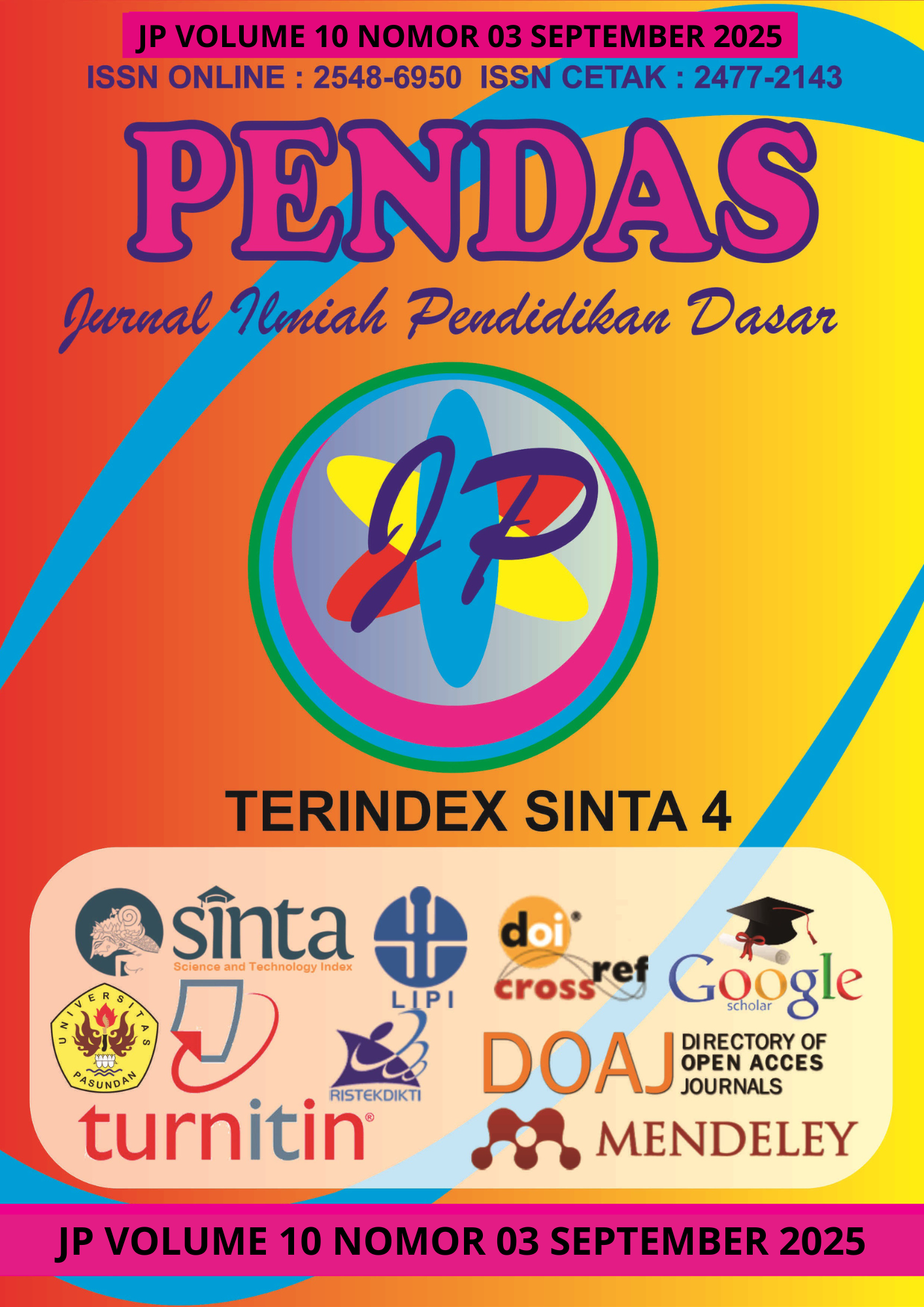PENGARUH KARAKTERISTIK GAYA BELAJAR GENERASI Z DAN MOTIVASI BELAJAR TERHADAP PRESTASI AKADEMIK MAHASISWA PRODI PENDIDIKAN ADMINISTRASI PERKANTORAN ANGKATAN 2023 UNIVERSITAS NEGERI MEDAN
DOI:
https://doi.org/10.23969/jp.v10i03.33069Keywords:
Generation Z learning styles, learning motivation, academic achievementAbstract
This study aims to determine the influence of Generation Z learning style characteristics and learning motivation on the academic achievement of students in the Office Administration Education Study Program, Class of 2023, Medan State University. The research employed an ex post facto design with a quantitative approach. The population consisted of 71 students, all of whom were taken as the sample using a saturated sampling technique. Data were collected through observation, documentation, and questionnaires, which were first tested for validity using the Product Moment correlation and reliability using Cronbach’s Alpha. Data were analyzed using multiple linear regression with the aid of SPSS version 26. The results showed that Generation Z learning style characteristics had a positive and significant effect on student’s academic achievement, with a t-value of 5.882 > t-table 1.997 and a significance level of 0.000 < 0.05. Likewise, learning motivation had a positive and significant effect, with a t-value of 4.267 > t-table 1.997 and a significance level of 0.000 < 0.05. Furthermore, the coefficient of determination (R²) was 0.683 or 68.3%. These findings confirm that Generation Z learning style characteristics and learning motivation have a significant positive influence on the academic achievement of Office Administration Education students, Class of 2023, Faculty of Economics, Medan State University.
Downloads
References
Aini, Q., Cahyaningrum, Apriliska, M., & Siswoyo, A. A. (2024). Tantangan Mahasiswa Baru dalam Menyesuaikan Diri di Lingkungan Pertemanan Program Studi PGSD Universitas Trunojoyo Madura. 2(12).
Akbar, H. I., Hapipi, & Mustari, M. (2024). Peran dan Tantangan Generasi Z sebagai Tenaga Pendidik dalam Menghadapi Era Digital. Berajah Journal, Vol 2 No.9, 615–624. https://doi.org/https://doi.org/10.47353/bj.v4i9.477
Ali, S., Moonti, U., & Yantu, I. (2022). Pengaruh Motivasi Dan Kemandirian Belajar Terhadap Hasil Belajar Siswa Pada Mata Pelajaran IPS Terpadu Kelas VIII Di SMP Negeri 1 Bulango Utara Kabupaten Bone Bolango. Aksara: Jurnal Ilmu Pendidikan Nonformal, 8(2), 1553. https://doi.org/10.37905/aksara.8.2.1553-1560.2022
Alruthaya, A., Nguyen, T. T., & Lokuge, S. (2021). The Application of Digital Technology and the Learning Characteristics of Generation Z in Higher Education. ACIS 2021 - Australasian Conference on Information Systems, Proceedings, 1–7.
Ardhiarisca, O., & Wijayanti, R. R. (2024). Pengaruh Motivasi terhadap Prestasi Belajar Mahasiswa Program Studi Akuntansi Sektor Publik Politeknik Negeri Jember Angkatan 2021/2022. Simposium Nasional Akuntansi Vokasi (SNAV) XII, 272–276.
Binus, P. (2023, September 27). Mengenal Generasi Z. BINUS University. https://parent.binus.ac.id/2023/09/mengenal-gen-z/?utm_source=chatgpt.com
BPS. (2020). Klasifikasi Generasi: Analysis of Census Bureau Population Estimates (25 June, 2020). In Bps. Sensus BPS. https://sensus.bps.go.id/topik/tabular/sp2020/2
Coe, E., Cordina, J., Enomoto, K., Jacobson, R., Seshan, N., & Mei, S. (2023). Addressing the unprecedented behavioral-health challenges facing Generation Z. Company & McKinsey. https://www.mckinsey.com/industries/healthcare/our-insights/addressing-the-unprecedented-behavioral-health-challenges-facing-generation-z.?/
Dr. Muh. Dahlan Thalib, M. A. (2019). Membangun Motivasi Velajar Dengan Pendekatan Kecerdasan Emosional dan Spiritual (M. . Dr. Tanwir (ed.)). IAIN Parepare Nusantara Press e-mail:
Farhana. (2022). Pengaruh Motivasi Belajar Terhadap Hasil Belajar Siswa Kelas IV di SD IT Al-Qur’aniyyah. Skripsi, 11–13.
Fitri, N. A., & Basri, H. (2022). Pengaruh Sistem Pembelajaran Daring, Motivasi Belajar Terhadap Prestasi Mahasiswa Dengan Minat Belajar Sebagai Variabel Moderasi. Ekombis Review: Jurnal Ilmiah Ekonomi Dan Bisnis, 10(2), 609–618. https://doi.org/https://doi.org/10.37676/ekombis.v10i2
Fitriatin, N., Silfiyah, L., & Mamnun, A. (2023). Peningkatan Prestasi Akademik Mahasiswa Jurusan Pendidikan dari Sekolah Menengah Kejuruan (SMK) melalui Keprofesionalan Dosen Khususnya di Fakultas Tarbiyah. Jurnal Kependidikan Islam, 13, 10–25. https://doi.org/DOI: 0.15642/jkpi.2023.13.2.10-25
Foundation, the A. E. C. (2024). Statistics Snapshot: Generation Z and Education. The Annie E. Casey Foundation. https://www.aecf.org/blog/generation-z-and-education
Hayati, E. N. (2024). Karakteristik Belajar Generasi Z dan Implikasinya terhadap Desain Pembelajaran IPS. 4(8), 4–8.
Hildawati, E. a. (2024). Buku Ajar Metodologi Penelitian Kuantitatif & Aplikasi Pengelolaan Analisa Data Statistik (Efitra (ed.); 1st ed.). PT. Sonpedia Publishing Indonesia.
Huss, J. (2023). Gen Z Students Are Filling Our Online Classrooms: Do Our Teaching Methods Need a Reboot? Journal of Scholarly Teaching, 18, 101–112. https://doi.org/10.46504/18202306hu
Iftode, D. (2020). Generation Z and Learning Styles. SSRN Electronic Journal, January 2019. https://doi.org/10.2139/ssrn.3518722
Ina Magdalena, Fatmawati, J. L. (2020). Strategi Guru Dalam Menghadapi Gaya Belajar. EDISI : Jurnal Edukasi Dan Sains, 2(1962), 151–168.
Julianti, U. F. (2022). Prestasi Belajar Mahasiswa Kaitannya dengan Kualitas Pengajaran Dosen (M. Nasrudin (ed.); 1st ed.). PT. Nasya Expanding Management.
Laksmi, N. P. A. D. L. D., Widhiantara, K., & Moedy, E. R. S. (2023). Pengaruh Motivasi Belajar, Sikap Bahasa, dan Kebiasaan Membaca terhadap Prestasi Belajar Bahasa Indonesia pada Mahasiswa Generasi Z di Kota Denpasar. Jurnal Ilmiah Cakrawarti, 6(2). https://doi.org/10.47532/jic.v6i2.901
Lopez, E. N., & Abadiano, M. (2023). Understanding Generation Z,The New Generation of Learners: ATechnological-Motivational-Learning Theory. Journal of Harbin Engineering University, 44(10), 770–784. https://www.researchgate.net/publication/375328954
Downloads
Published
Issue
Section
License
Copyright (c) 2025 Pendas : Jurnal Ilmiah Pendidikan Dasar

This work is licensed under a Creative Commons Attribution 4.0 International License.














































